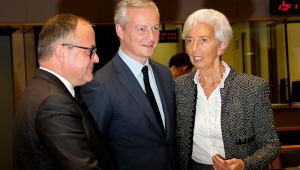The research found 12 governments, of the 18 studied in the European region, had already cut corporate tax rates or were planning to do so over the next few years.
Half of the countries were also found to have an “alarming number” of harmful tax practices, which can be used by multinational corporations to avoid tax, the European Network on Debt and Development (Eurodad) study said.
Eurodad’s tax expert Tove Maria Ryding said the findings were “deeply concerning”, as these European countries have failed to “clean up their own house” as multinationals can use the current tax structures to avoid taxes.
She said: “Governments have promised to make multinationals pay tax, but instead they’re slashing the corporate tax rate in a very costly and destructive race to the bottom.
“Looking at the EU and Norway, we found 12 governments that have either just cut the corporate tax rate, or are planning to do so in the near future.
“Governments were supposed to stop corporate tax avoidance – not get rid of corporate tax.”
The report said the average global corporate tax rate had been falling since the early 1980s, dropping from above 40% to below 25% in less than 35 years. If the changes to the tax rate continue, it could hit zero by 2052.
Out of the 18 countries analysed, including EU countries and Norway, only five countries received the “green light”, while Belgium, Hungary, Ireland, Italy, Latvia, Luxembourg, the Netherlands, Spain and the UK were found to have harmful tax practices.
The report, published Monday, comes as the EU is to publish its own “blacklist” of tax havens on Tuesday.
But the EU does not include member countries on the list, despite many being found by NGOs to meet the tax haven criteria.
Reducing corporate tax income would mean consumers have to pay more to fill the gap, which hits the poorest and could exacerbating inequality.
Ryding said: “The cost of corporate tax dodging is not just felt in Europe. Developing countries continue to pay a high price for a global tax system they didn’t create. Corporate tax income is a vital source of income for developing countries, who need money to fund schools and hospitals.”
Following the leaked Paradise Papers, governments around the world have been urged to introduce country-by-country reporting and increase transparency.
The Eurodad report found 10 of the analysed countries to be “reluctant or outright against the idea” of introducing country-by-country reporting, which would allow citizens to see where multinationals do business and how much they pay in taxes.
Only Slovenia was openly in support of the transparency measure.













